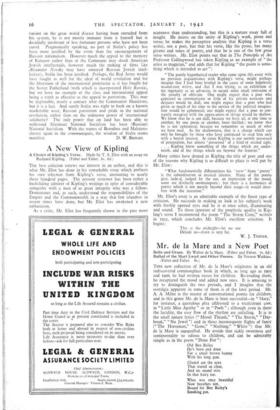A New View of Kipling
A Choice of Kipling's Verse. Made by T. S. Eliot with an essay on Rudyard Kipling. (Faber and Faber. 8s. 6d.)
THE best criticism renews our interest in an author, and this is what Mr. Eliot has done in his remarkable essay which prefaces his own selection from Kipling's verse, amounting to nearly three hundred pages. The present reviewer has been rather a backsliding admirer of Kipling's writings in spite of considerable sympathy with a man of so great integrity who was a fellow- Dominioner and, as such, understood the responsibilities of the Empire and the Commonwealth in a way that few islanders in recent times have done, but Mr. Eliot has awakened a new enthusiasm.
As a critic, Mr. Eliot has frequently shown in the past more acuteness than understanding, but this is a mature essay full of insight. He insists on the unity of Kipling's work, prose and verse; he makes the perceptive analysis that Kipling is a verse writer, not a poet, but that his verse, like his prose, has many gleams and tones of poetry, and that he is one of the few great verse writers. Mr. Eliot points out that in The Principle of Art Professor Collingwood has taken Kipling as an example of " the artist as magician," and adds that for Kipling " the poem is some- thing which is intended to act":
" The purely hypothetical reader who came upon this essay with no previous acquaintance with Kipling's verse, might perhaps imagine that I had been briefed in the cause of some hopelessly second-rate writer, and that I was trying, as an exhibition of my ingenuity as an advocate, to secure some small remission of the penalty of oblivion. One might expect that a poet who appeared to communicate so little of his private ecstasies and despairs would be dull; one might expect that a poet who had given so much of his time to the service of the political imagina- tion would be ephemeral; one might expect that a poet so con- stantly occupied with the appearances of things would be shallow. We know that he is not dull, because we have all, at one time or another, by one poem or another, been thrilled ; we know that he is not ephemeral, because we remember so much of what we have read. As for shallowness, that is a charge which can only be brought by those who have continued to read him only with a boyish interest. At times Kipling is not merely possessed of penetration, but almost ' possessed' of a kind of second sight. . . . Kipling knew something of the things which are under- neath, and of the things which are beyond the frontier."
Many critics have denied to Kipling the title of poet and one of the reasons why Kipling is so difficult to place is well put by Mr. Eliot : " What fundamentally differentiates his ' verse' from ' poetry' is the subordination or musical interest. Many of the poems give, indeQd, judged by the ear, an impression of the mood, some are distinctly onomatopoeic: but there is a harmonics of poetry which is not merely beyond their range—it would inter- fere with the intention."
Mr. Eliot's essay is an admirable example of the finest type of criticism. He succeeds in making us look at his subject's work with freshly opened eyes and he is at once sober, illuminating and sound. To those ignorant of the prophetic quality in Kip- ling's verse I recommend the poem " The Storm Cone," written in 1932, which concludes Mr. Eliot's excellent selection. It begins :
Ibis is the midnight—let no scat Delude us—dawn is very far. W. J. TURNER.


























 Previous page
Previous page